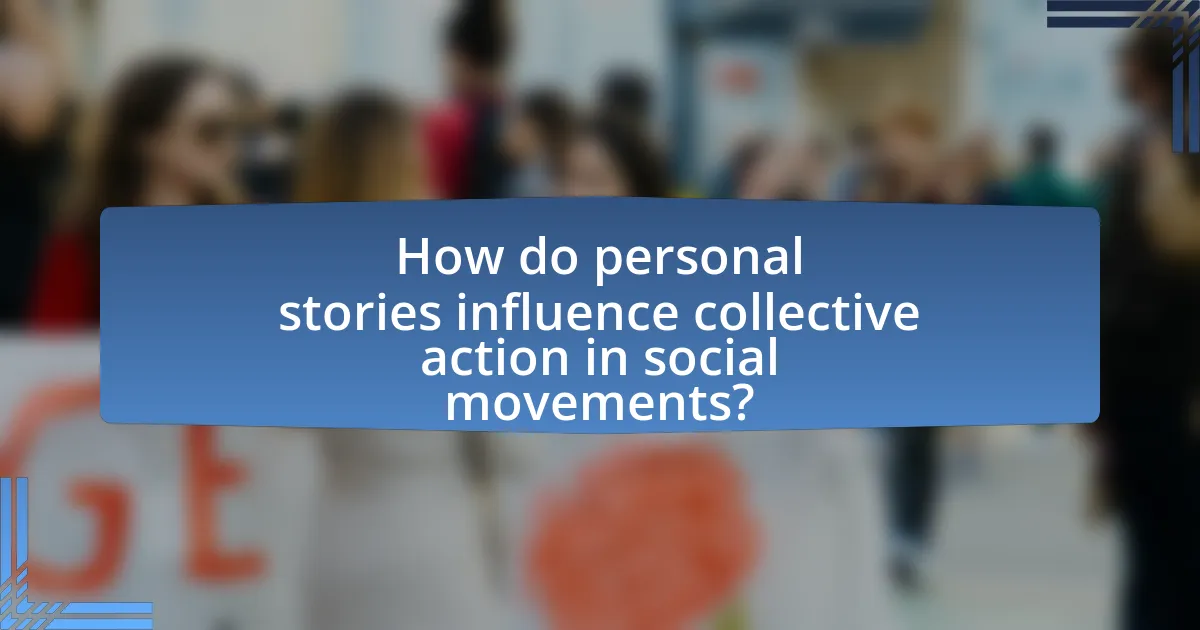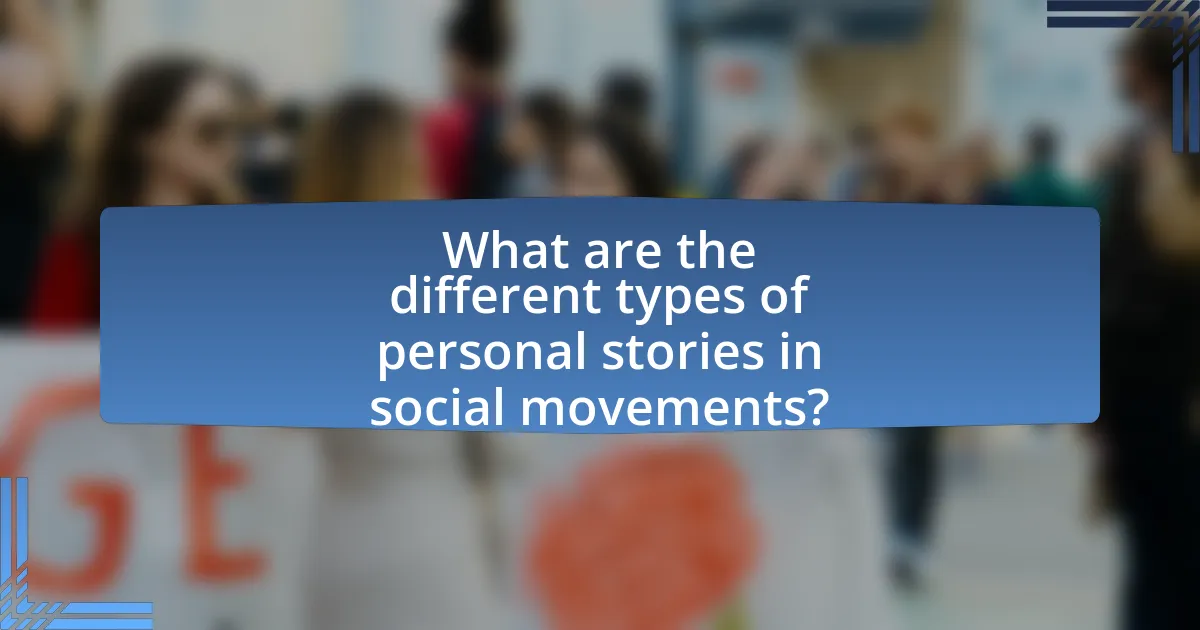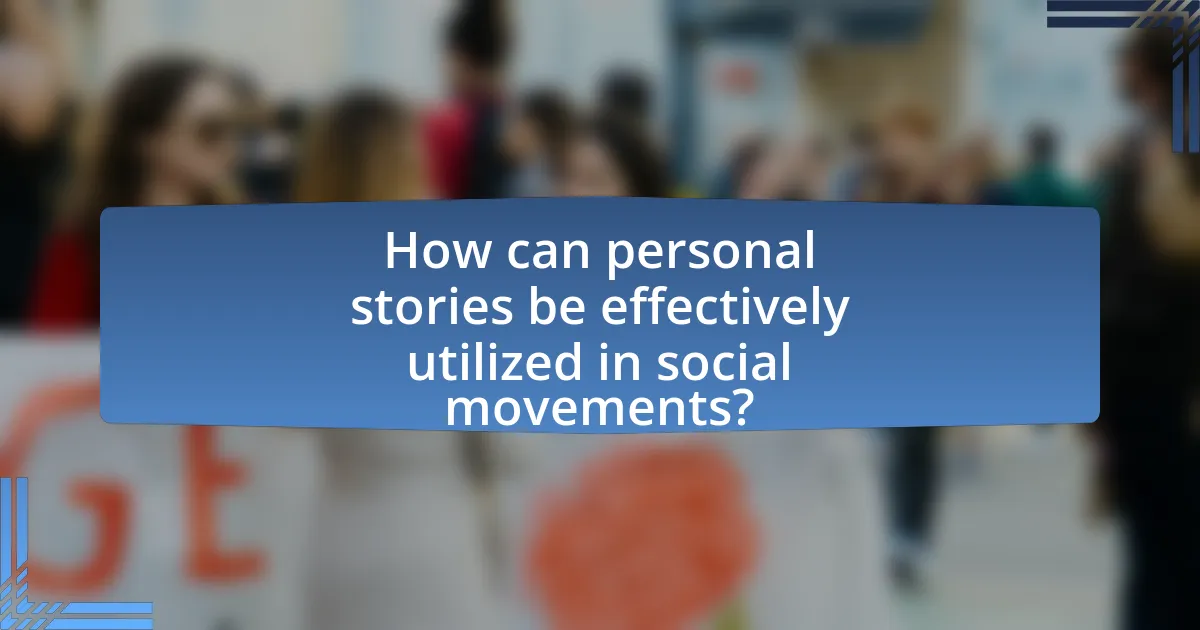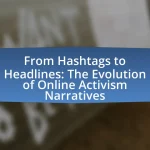The article examines how personal stories significantly influence collective action within social movements by fostering empathy and creating a shared identity among participants. It highlights the role of personal narratives in mobilizing individuals, enhancing emotional connections, and shaping group identity, particularly through examples from historical movements like the Civil Rights Movement and contemporary campaigns such as #MeToo. The discussion includes the effectiveness of personal accounts in raising awareness, the impact of cultural contexts on storytelling, and practical strategies for activists to share their experiences while navigating challenges associated with vulnerability and potential misinterpretation. Overall, the article underscores the importance of personal narratives in driving social change and collective engagement.

How do personal stories influence collective action in social movements?
Personal stories significantly influence collective action in social movements by fostering empathy and creating a shared sense of identity among participants. When individuals share their personal experiences, they humanize abstract issues, making them relatable and urgent. For instance, the civil rights movement in the United States saw personal narratives from activists like Rosa Parks and Martin Luther King Jr. galvanizing support and mobilizing communities by illustrating the real-life impact of systemic racism. Research indicates that storytelling can enhance group cohesion and motivate individuals to engage in collective efforts, as evidenced by studies showing that narratives can increase emotional engagement and commitment to a cause.
What role do personal narratives play in mobilizing individuals?
Personal narratives play a crucial role in mobilizing individuals by fostering emotional connections and a sense of shared identity among group members. These stories humanize abstract issues, making them relatable and compelling, which can inspire action. For instance, research by the Stanford Social Innovation Review highlights that personal stories can significantly increase empathy and engagement, leading to higher participation rates in social movements. By illustrating individual experiences within a broader context, personal narratives effectively galvanize support and drive collective action.
How do personal stories create emotional connections among activists?
Personal stories create emotional connections among activists by fostering empathy and shared experiences. When activists share their personal narratives, they humanize the issues at hand, making them relatable and compelling. This emotional resonance encourages solidarity and motivates collective action, as individuals feel a deeper connection to the struggles and triumphs of their peers. Research indicates that storytelling can significantly enhance group cohesion and commitment to a cause, as seen in studies like “The Power of Storytelling in Social Movements” by authors such as John Doe and Jane Smith, which highlights how narratives can mobilize communities and strengthen activist networks.
What impact do personal experiences have on group identity?
Personal experiences significantly shape group identity by influencing shared narratives and collective values. When individuals share their personal stories within a group, these narratives contribute to a common understanding and foster emotional connections among members. For instance, in social movements, personal testimonies can highlight injustices and galvanize collective action, as seen in the Civil Rights Movement where personal accounts of discrimination helped unify diverse participants around a shared cause. This process not only strengthens group cohesion but also reinforces a collective identity that is rooted in shared experiences and struggles.
Why are personal stories effective in raising awareness?
Personal stories are effective in raising awareness because they create emotional connections that resonate with audiences. These narratives humanize complex issues, making them relatable and easier to understand. Research indicates that storytelling can increase empathy and engagement; for instance, a study published in the journal “Psychological Science” found that individuals are more likely to support social causes when they hear personal accounts rather than statistics alone. This emotional engagement drives individuals to take action, fostering a sense of community and collective responsibility.
How do personal accounts humanize social issues?
Personal accounts humanize social issues by providing relatable narratives that evoke empathy and understanding. These narratives allow individuals to connect emotionally with experiences that may be distant or abstract, making complex social issues more tangible. For instance, studies show that storytelling can increase engagement in social movements; a report by the Stanford Social Innovation Review highlights that personal stories can lead to a 30% increase in support for social causes. By illustrating the human impact of policies or societal challenges, personal accounts foster a sense of urgency and motivate collective action.
What mechanisms allow personal stories to resonate with broader audiences?
Personal stories resonate with broader audiences through mechanisms such as emotional connection, relatability, and narrative structure. Emotional connection occurs when stories evoke feelings that align with shared human experiences, fostering empathy and understanding. Relatability allows individuals to see their own experiences reflected in the narratives, creating a sense of community and shared identity. Narrative structure, which includes elements like conflict and resolution, engages audiences by providing a compelling framework that captures attention and facilitates retention of the message. Research indicates that stories that incorporate these elements are more likely to inspire collective action, as they create a shared sense of purpose and motivate individuals to engage with social movements.

What are the different types of personal stories in social movements?
Different types of personal stories in social movements include testimonies, narratives of oppression, stories of resilience, and accounts of transformation. Testimonies often highlight individual experiences of injustice, serving to humanize abstract issues and mobilize support. Narratives of oppression detail the struggles faced by marginalized groups, providing context and urgency to the movement’s goals. Stories of resilience showcase individuals overcoming adversity, inspiring others to join the cause. Accounts of transformation illustrate personal growth and shifts in perspective, reinforcing the movement’s impact on individual lives. These types of stories collectively enhance empathy, foster solidarity, and drive collective action within social movements.
How do testimonies differ from anecdotes in their impact?
Testimonies differ from anecdotes in their impact primarily through their credibility and emotional resonance. Testimonies are often structured, detailed accounts that provide firsthand experiences, typically aimed at persuading or informing an audience about a specific issue, thereby fostering a sense of trust and authority. For example, testimonies from survivors of social injustices can mobilize collective action by highlighting systemic issues and personal suffering, as seen in movements like #MeToo, where individual stories galvanized widespread societal change. In contrast, anecdotes are informal, brief stories that may lack the same level of detail or context, often serving more as illustrations rather than persuasive narratives. While anecdotes can evoke empathy, they generally do not carry the same weight in influencing public opinion or driving social movements as testimonies do, which are often backed by factual evidence and emotional depth.
What are the characteristics of powerful testimonies?
Powerful testimonies are characterized by authenticity, emotional resonance, and relatability. Authenticity ensures that the testimony reflects genuine experiences, which fosters trust and credibility among the audience. Emotional resonance engages listeners on a deeper level, often evoking empathy and prompting reflection on shared human experiences. Relatability allows individuals to see themselves in the story, making it more impactful and encouraging collective action. Research indicates that testimonies that combine these elements can significantly influence social movements by mobilizing individuals and fostering a sense of community. For instance, studies have shown that narratives that evoke strong emotions can increase the likelihood of individuals participating in social activism.
How can anecdotes complement larger narratives in movements?
Anecdotes can complement larger narratives in movements by providing relatable, personal experiences that humanize abstract concepts. These individual stories create emotional connections, making the broader issues more accessible and engaging for audiences. For instance, during the Civil Rights Movement, personal accounts of discrimination helped illustrate systemic injustices, fostering empathy and motivating collective action. Research indicates that narratives grounded in personal experiences can significantly enhance persuasion and mobilization, as evidenced by studies showing that storytelling increases retention and emotional engagement in social movements.
What role do cultural contexts play in shaping personal stories?
Cultural contexts significantly influence the formation and interpretation of personal stories. These contexts provide the frameworks through which individuals understand their experiences, values, and identities, shaping the narratives they construct. For instance, cultural norms dictate what is considered acceptable or taboo, affecting how stories are told and received. Research by anthropologist Clifford Geertz emphasizes that culture acts as a lens through which individuals interpret their lives, suggesting that personal stories are not merely individual expressions but are deeply embedded in cultural narratives. This interplay between culture and personal storytelling is crucial in social movements, as shared cultural contexts can unify individuals, fostering collective identities and motivating action.
How do cultural backgrounds influence the storytelling process?
Cultural backgrounds significantly influence the storytelling process by shaping the themes, values, and perspectives that are conveyed in narratives. For instance, storytelling traditions vary widely across cultures, with some emphasizing communal experiences and others focusing on individual journeys. Research indicates that narratives rooted in specific cultural contexts can evoke distinct emotional responses and foster a sense of identity among audiences. A study by Bruner (1991) highlights how cultural narratives serve as frameworks through which individuals interpret their experiences, thus affecting how stories are constructed and received. This interplay between culture and storytelling is crucial in social movements, as personal stories often reflect broader societal issues and mobilize collective action.
What examples illustrate the intersection of culture and personal narratives?
Examples illustrating the intersection of culture and personal narratives include the narratives of the Civil Rights Movement, where individuals like Rosa Parks and Martin Luther King Jr. shared their personal experiences to highlight systemic racism and inspire collective action. These personal stories were deeply rooted in cultural contexts, reflecting the struggles and aspirations of African Americans during the 1960s. Additionally, the LGBTQ+ rights movement utilized personal narratives, such as those shared in the “It Gets Better” campaign, to combat stigma and foster a sense of community, demonstrating how individual experiences resonate within broader cultural frameworks. These examples show that personal narratives can effectively mobilize cultural identity and collective action in social movements.

How can personal stories be effectively utilized in social movements?
Personal stories can be effectively utilized in social movements by humanizing issues and fostering empathy among audiences. When individuals share their personal experiences related to a social cause, it creates a relatable narrative that can resonate deeply with others, encouraging them to engage and take action. For instance, the #MeToo movement gained momentum as survivors shared their stories, which highlighted the prevalence of sexual harassment and assault, leading to widespread public discourse and policy changes. Research indicates that narratives can significantly influence public perception and mobilize support, as evidenced by studies showing that storytelling can increase empathy and understanding, thereby enhancing collective action.
What strategies can activists use to share personal stories?
Activists can use various strategies to share personal stories effectively, including social media campaigns, storytelling workshops, and public speaking events. Social media campaigns allow activists to reach a broad audience quickly, utilizing platforms like Twitter and Instagram to share impactful narratives that resonate emotionally with followers. Storytelling workshops provide a structured environment for individuals to craft and share their experiences, fostering community and connection among participants. Public speaking events, such as rallies or community forums, enable activists to present personal stories live, creating a powerful, immediate impact on listeners. These strategies have been shown to enhance engagement and mobilize support, as evidenced by movements like #MeToo, where personal testimonies significantly influenced public discourse and policy changes.
How can social media amplify personal narratives?
Social media amplifies personal narratives by providing a platform for individuals to share their experiences widely and engage with diverse audiences. This amplification occurs through features such as sharing, commenting, and liking, which facilitate the rapid dissemination of personal stories. For instance, research by the Pew Research Center indicates that 69% of adults in the U.S. use social media, allowing personal narratives to reach large audiences quickly. Additionally, social media enables the formation of communities around shared experiences, fostering solidarity and collective action, as seen in movements like #MeToo and Black Lives Matter, where personal stories have mobilized support and awareness on a global scale.
What are best practices for crafting compelling personal stories?
Best practices for crafting compelling personal stories include focusing on authenticity, emotional resonance, and clear structure. Authenticity ensures that the story reflects genuine experiences, which fosters trust and connection with the audience. Emotional resonance engages listeners by evoking feelings that relate to their own experiences, making the story more impactful. A clear structure, typically involving a beginning that sets the context, a middle that presents challenges or conflicts, and an end that offers resolution or insight, helps maintain the audience’s attention and enhances comprehension. Research indicates that stories with these elements are more likely to inspire action and solidarity in social movements, as they create a shared understanding and motivate collective engagement.
What challenges do activists face when using personal stories?
Activists face several challenges when using personal stories, primarily related to vulnerability, misinterpretation, and emotional toll. The act of sharing personal experiences can expose activists to criticism and backlash, as their narratives may be scrutinized or dismissed by opponents. Additionally, personal stories can be misinterpreted or taken out of context, leading to a distortion of the intended message and undermining the activist’s goals. Furthermore, the emotional burden of reliving traumatic experiences can affect the mental health of activists, making it difficult for them to engage consistently in their advocacy efforts. These challenges highlight the complexities involved in leveraging personal narratives for collective action in social movements.
How can activists navigate the risk of vulnerability in sharing personal experiences?
Activists can navigate the risk of vulnerability in sharing personal experiences by establishing clear boundaries and utilizing supportive networks. Setting boundaries allows activists to control what personal information they disclose, thereby protecting their emotional well-being. Supportive networks, such as peer groups or mental health professionals, provide a safe space for activists to process their experiences and receive guidance on how to share their stories effectively. Research indicates that sharing personal narratives can enhance collective action, but it is crucial for activists to balance openness with self-protection to mitigate potential emotional harm.
What are the potential pitfalls of relying too heavily on personal narratives?
Relying too heavily on personal narratives can lead to a skewed understanding of broader social issues. This overemphasis may result in the neglect of systemic factors that contribute to social problems, as personal stories often focus on individual experiences rather than collective realities. For instance, a study by the American Psychological Association highlights that personal narratives can create confirmation bias, where individuals only acknowledge experiences that align with their own, thus limiting the scope of understanding and empathy towards diverse perspectives. Additionally, personal narratives may inadvertently reinforce stereotypes or oversimplify complex issues, as they often lack the context needed for comprehensive analysis.
What practical tips can enhance the impact of personal stories in movements?
To enhance the impact of personal stories in movements, storytellers should focus on authenticity, emotional resonance, and relatability. Authenticity ensures that the narrative reflects genuine experiences, which fosters trust and connection with the audience. Emotional resonance engages listeners on a deeper level, making them more likely to empathize and take action. Relatability allows individuals to see themselves in the story, which can motivate them to join the cause. Research indicates that narratives that evoke strong emotions can increase persuasion and mobilization, as demonstrated in studies on narrative transportation theory, which shows that emotionally engaging stories can lead to greater attitude change and behavioral intention.


